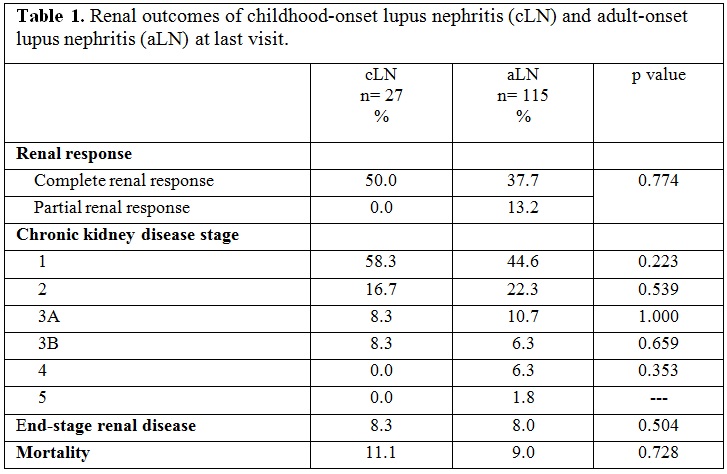Session Information
Date: Tuesday, November 9, 2021
Title: Pediatric Rheumatology – Clinical Poster III: Miscellaneous Rheumatic Disease (1614–1644)
Session Type: Poster Session D
Session Time: 8:30AM-10:30AM
Background/Purpose: Approximately 20% of patients with systemic lupus erythematosus (SLE) are diagnosed before 18 years of age. Pediatric patients have a worse disease course when compared to adults, and nearly 50% present with renal involvement. Most studies on childhood-onset lupus nephritis (cLN) are limited to the pediatric period. Therefore, we sought to determine the long term clinical outcomes in patients with cLN after reaching adulthood.
Methods: A cohort of Hispanics from Puerto Rico with SLE (per 1997 American College of Rheumatology classification criteria) was studied. Lupus nephritis (LN) was defined as the presence of proteinuria >0.5 g per day, urinary cellular casts, and/or a renal biopsy consistent with LN. Demographic parameters, clinical manifestations, comorbidities, disease activity (per Systemic Lupus Erythematosus Disease Activity Index ([SLEDAI]), disease damage (per Systemic Lupus International Collaborating Clinics/American College of Rheumatology Damage Index [SDI]), pharmacologic therapy, renal response, and chronic kidney disease staging (per National Kidney Foundation) were gathered at LN onset (baseline) and at last visit. Data from patients with cLN were compared to those with adult-onset LN (aLN) using Chi-square test, Fisher’s exact test, or Mann-Whitney test, as appropriate.
Results: In total, 142 SLE patients with LN were studied; 27 (19%) had cLN and 115 (81%) had aLN. Among cLN patients, 88% were female. The mean (standard deviation [SD]) age at SLE diagnosis and LN onset for cLN patients were 14.6 (3.2) and 16.1 (3.9) years, respectively. The mean (SD) LN duration and follow-up after reaching adulthood were 14.7 (7.8) and 13.4 (7.7) years, respectively. No significant differences were found at baseline and last visit for lupus manifestations, comorbidities, SLEDAI and SDI scores, and pharmacologic treatment (induction and maintenance therapeutic modalities) between patients with cLN and aLN. Renal outcomes are depicted in table1. No significant differences were found for renal outcomes between these groups.
Conclusion: In this cohort of Puerto Ricans with SLE, patients with cLN followed through adulthood for more than a decade had a favorable outcome. Most patients remained in chronic kidney disease stage 1 or 2 and few evolved into end-stage-renal disease. Furthermore, long term renal outcomes were similar to those with aLN. The results of this study differ from those from other ethnic populations that show poor clinical outcomes in patients with cLN.
To cite this abstract in AMA style:
Cintrón D, Márquez S, Vilá L. Long Term Follow-Up of Patients with Childhood-Onset Lupus Nephritis After Transition to Adult Care [abstract]. Arthritis Rheumatol. 2021; 73 (suppl 9). https://acrabstracts.org/abstract/long-term-follow-up-of-patients-with-childhood-onset-lupus-nephritis-after-transition-to-adult-care/. Accessed .« Back to ACR Convergence 2021
ACR Meeting Abstracts - https://acrabstracts.org/abstract/long-term-follow-up-of-patients-with-childhood-onset-lupus-nephritis-after-transition-to-adult-care/

